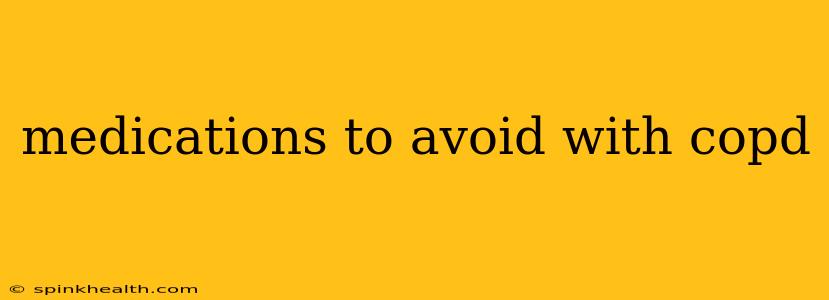Medications to Avoid with COPD: Navigating the Labyrinth of Lung Health
Chronic Obstructive Pulmonary Disease (COPD) is a progressive lung disease making breathing difficult. Managing COPD effectively requires careful consideration of medications, as some can worsen symptoms or interact dangerously with others you might be taking. This isn't just about avoiding certain drugs; it's about building a personalized treatment plan with your doctor to maximize your lung health and quality of life. Let's navigate this together.
Imagine COPD as a delicate ecosystem within your lungs. Certain medications can disrupt this balance, leading to unexpected consequences. Knowing which medications to avoid is crucial to protecting this ecosystem and maintaining your well-being.
What Medications Should People with COPD Avoid?
This isn't a simple list, as individual needs vary. However, certain medication classes carry a higher risk of exacerbating COPD symptoms or interacting negatively with other respiratory medications.
1. Anticholinergics (Some): While some anticholinergics are used to treat COPD (like ipratropium), others, particularly those used for urinary incontinence or other conditions, can worsen COPD symptoms by drying secretions and making it harder to cough. Always discuss any anticholinergic medication with your doctor, ensuring they understand your COPD.
2. Opioid Pain Relievers: Opioids, while effective for pain management, can significantly depress respiratory drive, potentially leading to dangerously slow breathing, especially in those already struggling with COPD. If pain management is necessary, your doctor will explore alternatives or closely monitor your respiratory status if opioids are unavoidable.
3. Certain Sedatives and Anxiolytics: Some sedatives and anxiolytics, like benzodiazepines, can depress the respiratory system, further compromising breathing in people with COPD. If you need medication for anxiety or sleep, your doctor can help you find safer alternatives.
4. Non-Steroidal Anti-Inflammatory Drugs (NSAIDs): While not always a contraindication, some studies suggest that regular use of NSAIDs like ibuprofen or naproxen may increase the risk of exacerbations in COPD patients. This is often linked to their potential to worsen fluid retention and inflammation. Always discuss NSAID use with your doctor.
5. Beta-blockers (Some): While some beta-blockers are necessary for heart conditions, some can worsen airflow obstruction in COPD patients. However, cardio-selective beta-blockers may be a safer option in some cases, determined by your cardiologist in conjunction with your pulmonologist.
Frequently Asked Questions (FAQs) about COPD and Medication
Here we address some common questions surrounding medication and COPD.
H2: What are the risks of taking antihistamines with COPD?
While many over-the-counter antihistamines are relatively safe, some older generations can cause drowsiness and thicken mucus, which may worsen COPD symptoms, especially in individuals with significant mucus production. Always opt for newer antihistamines that have less sedative impact if possible and always consult your doctor before starting any new medication.
H2: Can I take over-the-counter medications for colds and flu if I have COPD?
This depends greatly on the medication's ingredients. Many over-the-counter cold and flu remedies contain decongestants, which can constrict airways and worsen COPD symptoms. Always check the ingredients and consult your doctor or pharmacist before use. They can recommend suitable alternatives that don't negatively impact your respiratory health.
H2: How can I manage my COPD medications effectively?
Medication adherence is key to effective COPD management. Use a pill organizer, set reminders, and engage with your doctor or respiratory therapist to understand your medication plan. Discuss any difficulties you have with medication administration, and never hesitate to seek clarification. This proactive approach will significantly contribute to better management of your condition.
H2: Are there any natural remedies or supplements that can help with COPD?
While some complementary therapies may offer symptomatic relief, like breathing exercises, they should never replace prescribed medications. Always discuss any supplements or alternative therapies with your doctor before starting them, ensuring they won't interact negatively with your existing medications.
Conclusion:
Managing COPD effectively requires a close collaboration with your healthcare team. Understanding which medications to avoid is a crucial part of that process. This information is not a substitute for professional medical advice. Always discuss your medications with your doctor, ensuring a safe and effective treatment plan tailored to your individual needs and health status. Open communication and a proactive approach will significantly impact your journey with COPD.

